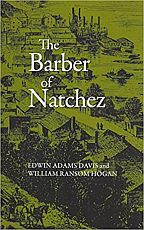
296 pages / 5.50 x 8.50 inches / 1 halftone
History / United States - Southern History
In The Barber of Natchez, Edwin Adams Davis and William Ransom Hogan tell the remarkable story of William Johnson, a slave who rose to freedom, business success, and high community standing in the heart of the South—all before 1850. Emancipated as a young boy in 1820, Johnson became a barber’s apprentice and later opened several profitable barber shops of his own. As his wealth grew, he expanded into real estate and acquired large tracts of nearby farm and timber land. The authors explore in detail Johnson’s family, work, and social life, including his friendships with people of both races. They also examine his wanton murder and the resulting trial of the man accused of shooting him. More than the story of one individual, the narrative also offers compelling insight into the southern code of honor, the apprentice system, and the ownership of slaves by free blacks. Based on Johnson’s two-thousand-page diary, letters, and business records, this extraordinary biography reveals the complicated life of a freedman in Mississippi and a new perspective on antebellum Natchez.
Edwin Adams Davis was the head of the Louisiana State University Department of Archives. He graduated from Kansas State Teachers College and received his advanced degrees at the State University of Iowa and LSU.
William Ransom Hogan was head of the Department of Archives at LSU and also served as chairman of the history department at Tulane University. He is the author of The Texas Republic: A Social and Economic History.
“A rare type of record of considerable historical and human interest. . . . The public will find in The Barber of Natchez a human being of unusual type, treated with compassion and understanding.”—Journal of Southern History
“An absorbing tale [that] makes a distinct contribution to the social and economic history of the Old South. . . . The book is clearly written, well organized, and thoroughly informative.”—Southwestern Social Science Quarterly
“A fascinating and well-written study of an unusual free Negro in an unusual Mississippi city. The work of the authors in editing the diary is excellent in every respect.”—North Carolina Historical Review
Found an Error? Tell us about it.